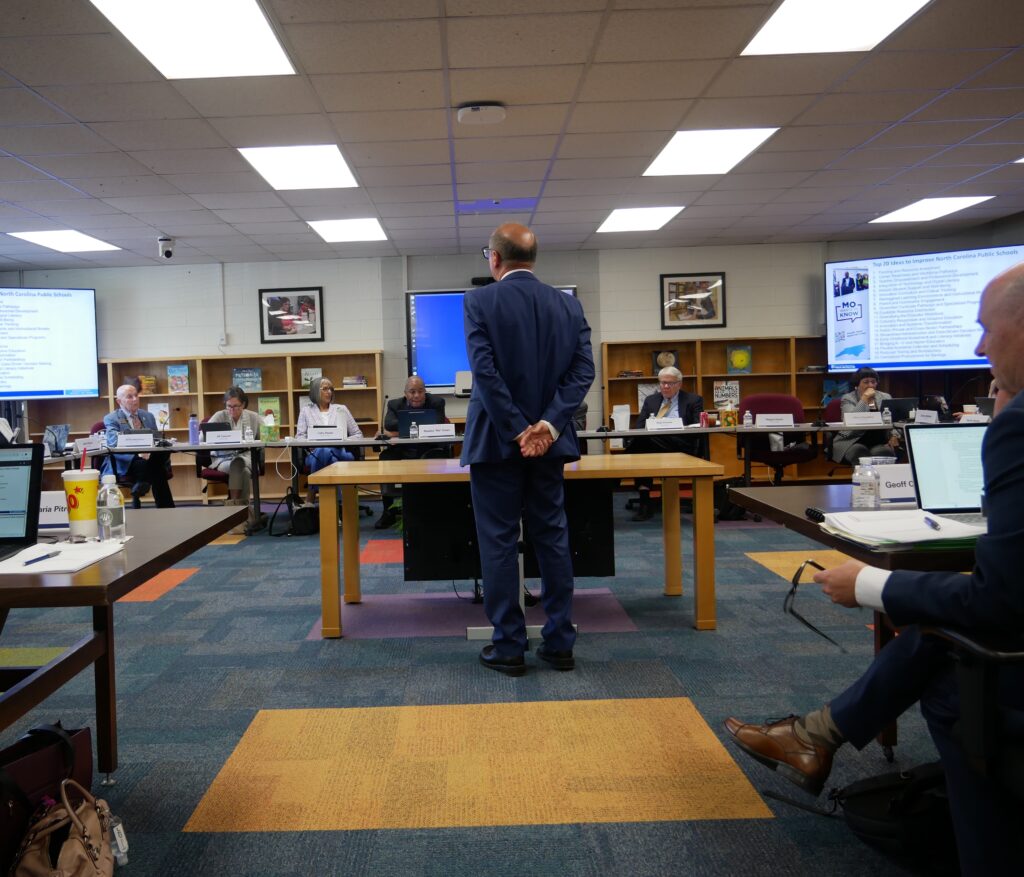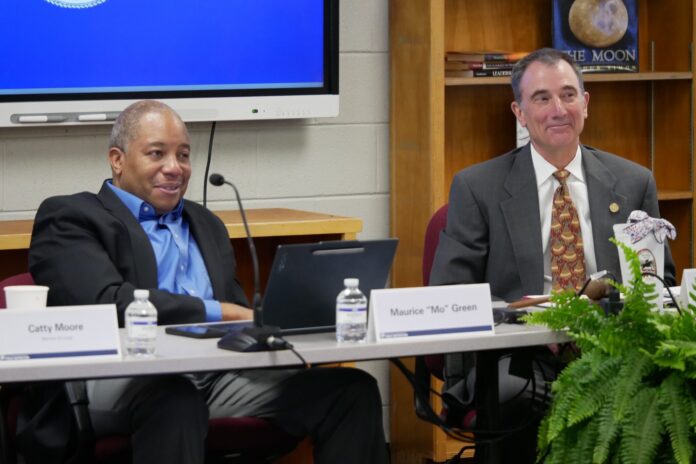Seven months after Hurricane Helene, State Board of Education members discussed their visions for North Carolina public schools at a three-day meeting in a former Haywood County elementary school library.
Educators told the members that schools need increased support and funding, both in the Western region and across the state, during the board’s first planning meeting since the election of Mo Green as superintendent of public instruction. Green said he will use the discussions to form the draft of his strategic plan, which he will present at the board’s June meeting.
“This idea that we can have the best public education system in the entire country … I’m not bashful about saying that because I do believe that it is indeed what we can do,” Green said.
At the meeting April 29 to May 1, members discussed teacher pay, the current legislative session, and how to better support teachers and students.
Notice: JavaScript is required for this content.
Teacher compensation
The state went from 38th to 43rd in the country in average teacher pay in a report from the National Education Association released during the meeting. The same report showed improvements in pay for beginning teachers, ranking the state 39th compared with 42nd last year.
Average annual teacher pay in the state is now $58,292, and the average starting salary is $42,542, according to the report. It says the state’s “minimum living wage” is $58,411.
“I think it’s very important that that change in a dramatic way,” Vice Chair Alan Duncan said of the report’s findings.

The Department of Public Instruction (DPI) is tracking nearly 350 bills with implications for education this session, said Geoff Coltrane, DPI’s senior director of government affairs and strategy. Coltrane’s presentation includes links to “bills to watch” in the House and Senate on calendar flexibility, teacher licensure, school performance grades, and more.
The Senate budget plan, released in April, includes an average 2.3% teacher pay increase in 2025-26 and an average increase of 3.3% over the biennium, plus a $3,000 bonus. Those raises will bring average teacher pay to $62,407, Senate leaders said.
Coltrane called those raises “very modest.”
The House will release its budget next. Then the two chambers will work toward a compromise budget.
“This is an important time to say to our educators, ‘You really matter. You are important. You are the future of North Carolina,’ and we don’t appear to be sending that message,” Duncan said.
Kimberly Jones, the 2023 North Carolina Teacher of the Year, said educators need compensation that creates dignity in the profession.
“It should be commensurate with cost of living and comparative models to what our colleagues around us are earning,” Jones said.
Not just classroom teachers
An entire team of professionals is needed to support students’ needs, educators and DPI officials said. That’s especially true as students recover from Helene.
“Seven months since the storm, kids are finally feeling safe enough to talk about the isolation that they felt,” said Molly Pitman, a school social worker in Haywood County Schools, in a presentation on her work.
Pitman said her work is dependent on relationships with community agencies, as well as working alongside various school employees.
“Our kids need to know that they can come to school every day and feel safe and supported and seen,” she said. “We can’t do that without teachers to greet them at the door each day, or without cafeteria workers or custodians to keep the day-to-day operations going, or without counselors or social workers to look them in the eye and tell them that we’ve got them, that we will see them through.”
DPI has requested additional legislative funding for more school nurses, counselors, psychologists, and social workers in recent years, said Ellen Essick, section chief for NC Healthy Schools at DPI.
This year, the department and the State Board are requesting about $65.5 million each year to recruit more of these professionals. Gov. Josh Stein’s budget includes $32.7 million each year for that purpose. The Senate proposal includes about $14 million each year.
The ratio between students and different support personnel vary from district to district, Essick said, sharing the following maps. Some districts are meeting the ratios recommended by national associations, and some districts lack certain professionals altogether. When it comes to school social workers, no districts meet the recommended ratio.
“We need all of them,” Essick said. “We need teams, because they do not do the same task. Services for students, sometimes they overlap, but they’re not the same. And when we do this, we get a return on that investment. We have improved educational outcomes. Kids come to school, they get the behavioral services they need, and their mental health is improved.”
Essick said DPI has prioritized addressing student mental health in recent years. On top of requesting legislative funding, the department has secured $15 million in grants to cover tuition for individuals going into certain fields and give recruitment incentives to districts, she said.
DPI is also working to provide professional development for schools to bill Medicaid for services to support students’ mental health, including to fund support personnel positions.
“It’s another way to have that sustainability that we need,” Essick said.
She said the Department of Health and Human Services will be funding a DPI position to focus solely on school-based Medicaid services.
“We’re doing everything we can to get more folks into the field and into the districts,” Essick said.
How to support beginning teachers
No matter how a teacher is prepared, beginning teachers need extra support once they arrive in a classroom, educators told board members.
The beginning teacher support program does this through mentorship and professional development. Participation in the program is associated with lower turnover, according to a DPI presentation.
But not every new teacher is participating, DPI officials said at the meeting. They found that 28% of beginning teachers in 2023 were not participating in the support program.
Eighteen percent of beginning teachers from traditional pathways were not participating. Twenty-nine percent of those with temporary licensures were not participating. And 36% of beginning teachers with “residency” licenses were not participating. Residency licensure allows individuals to immediately start teaching while obtaining a regular license through a preparation program.
DPI is completing a “reconciliation process,” asking districts why some teachers aren’t participating and ensuring district personnel understand that the program is required. Part of DPI’s request is for stipends for mentors, which the state once provided, said Derrick Jordan, DPI’s chief operations officer.
“The beginning teacher support program today is a bit of an unfunded mandate,” Jordan said.
Educators from the Western region told the board that mentor stipends would improve the program. The mentors are often teachers who are wearing many hats already, they said, and they need support to wear another one.
There should be a person whose entire role is dedicated to support beginning teachers, they said. These “beginning teacher coordinators” often also split their time among multiple duties.
“That allows for the time to collaborate with those mentors, no matter how big your district is,” said April Collins, director of recruitment and induction at Asheville City Schools. “That is a really, really important piece of growing our profession.”
Support from administrators and the entire school community is also important, the educators said.
“We ask teachers to differentiate for our students,” said Joni Allison, principal of Hendersonville Middle School. “We must differentiate for our teachers.”
Allison said that, as a principal, it’s important to recognize that different people struggle with different tasks.
“Sometimes it’s just sitting with them and making a parent phone call for the first time,” she said. “That’s kind of a scary thing.”
Opportunities to observe great teachers also makes a big difference. New teachers can see effective techniques for both instruction and classroom management, educators said.
“The challenge is then time,” said Shannon Marlowe, assistant superintendent for instructional services in Henderson County Schools. “How do you pull them away from your classrooms?”
Emma Maney, a teacher in Jackson County Public Schools, said her school sets aside one day a month for teachers to have out-of-classroom time. She has used it to observe a teacher, work with a small group of struggling students, and make parent calls. Maney was a finalist in the NC Beginning Teacher of the Year contest.
“That would be critical to the mental health and also just professional success in all beginning teachers,” Maney said.
Other items
The board welcomed new board member Janet Mason. Mason was appointed by Stein in April and represents the 8th educational district.
Mason is the town manager of Forest City, chair of the Rutherford County Schools Education Foundation Board, and former superintendent of Rutherford County Schools.
The board also discussed school accountability, learning standards, funding, teacher licensure, and supports for students and educators.
Several members shared their thoughts on what the public school system would look like if one could start from scratch.
The structure of the school day and year would look different, multiple board members said. Member Olivia Oxendine said that the day should start earlier and go later, and that schools should operate year-round with flexibility on breaks and calendar specifics.
Jones said two different school days, one earlier and one in the evening, could help better meet the needs of students who are working.
Universal pre-K was raised by several members as a component of their ideal system so children could be served sooner and be prepared for school.
Standards and assessments would better reflect students’ learning, and that learning should be centered on students’ interests and postsecondary opportunities, board members said. Schools should be held accountable for their growth, instead of only achievement on standardized tests.
“We could evaluate students not based solely on a grade that they get on an assignment on a day, but also evaluate them on their growth, place an emphasis on the growth,” said Ian House, the board’s student advisor. “How did they grow from the past assignment to the next one? How did they grow in the course of their education?”
Board members approved several reports, including a report on 11th graders graduating in three-year periods and an annual report on achievement among American Indian students.
Members also approved the middle-of-year literacy benchmark assessment results. From the beginning to the middle of the year, students are outperforming national scores. Disparities among subgroups remain, but each subgroup has improved and is scoring at or above national levels.
Amy Rhyne, the outgoing director of the Office of Early Learning, was recognized as she retires.
Oxendine, who recently won the Order of the Long Leaf Pine award, also was recognized. So was the staff of Hot Springs Elementary in Madison County Schools for their work serving the community through Helene.
Carolina Demography Director Nathan Dollar presented ADM (average daily membership) projections, as well as typology cohorts, a new framework to split counties with similar characteristics into useful categories.
Board members discussed how to market public schools as public funding expands to non-public environments.
“We are in a competitive environment,” said Chair Eric Davis, closing out the first day of the meeting. As more options are available for families and students, he said, public schools will be their best choice.
“We are gonna win,” Davis said.
